Preventing The Abuse of Dogs
You may have seen the commercials the Humane Society of the United States runs periodically, showing dogs who have been subjected to horrible abuse and neglect. Their recommendation is to donate money to them for all of their programs. That's fine, as far as it goes, but there are other ways in which you can personally have a positive effect on this growing problem.
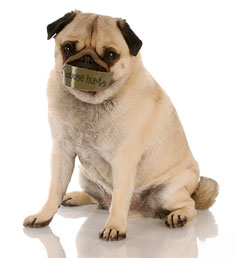
The Statistics
In 2009, there were 853 cases of abuse and neglect in the United States, meaning that for every one million people, three cases of abuse were reported. That may not sound like much, but I would submit to you that even one case is one too many, and not every case of abuse actually gets reported. On a per (human) capita basis, the worst states were Vermont, Nebraska, Oregon, Montana, and South Dakota. You can see a breakdown by state in the table below. Four states do not classify animal cruelty as a felony, although that doesn't appear to influence the number of cases, interestingly enough.
| State | Number Cases 2009* | Human Population July 2009^ | Cases per Million Humans | Ranking | State | Number Cases 2009* | Human Population July 2009^ | Cases per Million Humans | Ranking | |
| AK | 1 | 698,473 | 1.43 | 49 | MT | 7 | 974,989 | 7.18 | 4 | |
| AL | 13 | 4,708,708 | 2.76 | 29 | NC | 36 | 9,380,884 | 3.84 | 12 | |
| AR | 10 | 2,889,450 | 3.46 | 18 | ND | 1 | 646,844 | 1.55 | 45 | |
| AZ | 15 | 6,595,788 | 2.27 | 33 | NE | 16 | 1,796,619 | 8.91 | 2 | |
| CA | 52 | 36,961,664 | 1.41 | 50 | NH | 2 | 1,324,575 | 1.51 | 47 | |
| CO | 14 | 5,024,748 | 2.79 | 27 | NJ | 30 | 8,707,739 | 3.45 | 19 | |
| CT | 7 | 3,518,288 | 1.99 | 39 | NM | 7 | 2,009,671 | 3.48 | 17 | |
| DC | 2 | 599,657 | 3.34 | 20 | NV | 4 | 2,643,085 | 1.51 | 46 | |
| DE | 2 | 885,122 | 2.26 | 34 | NY | 54 | 19,541,453 | 2.76 | 28 | |
| FL | 71 | 18,537,969 | 3.83 | 13 | OH | 20 | 11,542,645 | 1.73 | 44 | |
| GA | 29 | 9,829,211 | 2.95 | 24 | OK | 14 | 3,687,050 | 3.80 | 15 | |
| HI | 5 | 1,295,178 | 3.86 | 11 | OR | 28 | 3,825,657 | 7.32 | 3 | |
| IA | 12 | 3,007,856 | 3.99 | 8 | PA | 54 | 12,604,767 | 4.28 | 7 | |
| ID | 6 | 1,545,801 | 3.88 | 10 | RI | 2 | 1,053,209 | 1.90 | 41 | |
| IL | 28 | 12,910,409 | 2.17 | 37 | SC | 16 | 4,561,242 | 3.51 | 16 | |
| IN | 18 | 6,423,113 | 2.80 | 26 | SD | 5 | 812,383 | 6.15 | 5 | |
| KS | 5 | 2,818,747 | 1.77 | 43 | TN | 24 | 6,296,254 | 3.81 | 14 | |
| KY | 14 | 4,314,113 | 3.25 | 21 | TX | 46 | 24,782,302 | 1.86 | 42 | |
| LA | 10 | 4,492,076 | 2.23 | 35 | UT | 4 | 2,784,572 | 1.44 | 48 | |
| MA | 13 | 6,593,587 | 1.97 | 40 | VA | 31 | 7,882,590 | 3.93 | 9 | |
| MD | 12 | 5,699,478 | 2.11 | 38 | VT | 7 | 632,760 | 11.06 | 1 | |
| ME | 1 | 1,318,301 | 0.76 | 51 | WA | 20 | 6,664,195 | 3.00 | 23 | |
| MI | 29 | 9,969,727 | 2.91 | 25 | WI | 13 | 5,654,774 | 2.30 | 32 | |
| MN | 13 | 5,265,214 | 2.47 | 30 | WV | 4 | 1,819,777 | 2.20 | 36 | |
| MO | 14 | 5,987,580 | 2.34 | 31 | WY | 3 | 544,270 | 5.51 | 6 | |
| MS | 9 | 2,951,996 | 3.05 | 22 | TTL | 853 | 307,016,560 | 2.78 |
^ InfoPlease.com
Is it abuse?
The first step to preventing abuse lies in recognizing it. Cases of abuse can range from neglect or abandonment to more overt abuse like fighting, shooting, torture, beating, hoarding, kicking, bestiality, hanging, poisoning, burning, stabbing, choking, or even theft. Obviously, some of these will be much easier to spot than others. The American Humane Association emphasizes that just because your neighbor treats their animals differently than you treat yours, it doesn't necessarily mean they are abusing them.
They also recommend making sure you have the whole picture before making accusations. For example, if your neighbor feeds his dogs before he goes to work the midnight shift, you might think the dog is not being fed because you never see it happen.
There are certain signs that are indicative of neglect, no matter what you can see or not see. A collar that is too tight can injure the dog or even cause strangulation. An excessive lack of grooming, to the point where the dog is becoming matted might mean there are sores underneath all of that fur. Untreated mange causes the dog to scratch and bite to relieve the itch caused by parasites, and you would notice a loss of fur and sores on the skin. And finally, a dog who is excessively thin may be suffering from starvation.
Abuse is a little easier to spot than neglect. If you see an animal being kicked, choked, set on fire, dunked under water, or hit, you can be sure the animal is being abused.
What should I do if I suspect abuse or neglect?
In the case of neglect, you may be able to mention some good care techniques to the dog guardian if you are on good terms, and see if the situation improves. It may be that the person has simply never had a dog before and doesn't know what to do. Alternatively, it may be a question of money, and if bring up the subject, you might learn of a way you can help, maybe by dropping off a bag of dog food on the person's doorstep anonymously.
If the situation doesn't improve, or if you see outright abuse, your next step should be reporting the situation to authorities. If you can take pictures or videos of the abuse from a safe distance, it can help with prosecution. Even without pictures, you can report the abuse or neglect to your animal control department, police department, or humane society. It's better to leave the confrontation to the authorities because animal abuse is often related to other types of violence such as child abuse or domestic violence.
Once you have reported the abuse or neglect, it is likely that the authorities will not be permitted to discuss the case details with you, and they may not be able to follow up on the situation as quickly as you would like, but that doesn't mean you can't make a phone call after a few days just to make sure the case stays on their radar. They may be able to tell you that they have educated the owner, removed the animal, or even that the case doesn't meet the legal standard for abuse in your state.
To find out more about the laws in your state, click here.
Why would someone have a pet just to abuse them?
According to a study done by Kellert and Felthous, there are nine reasons why most people act to intentionally abuse their animals:
- to control an animal
- to retaliate against an animal
- to retaliate against another person
- to satisfy a prejudice against a species or breed
- to express anger through an animal
- to enhance one's own aggressiveness
- to shock people for amusement
- to displace hostility from a person to an animal
- to perform non-specific sadism
How can I help end animal cruelty?
You might be surprised that every-day people can help prevent animal cruelty. You don't have to throw fake blood on people who wear fur or break into animal labs to set the critters free. You can take small steps that will add up to big improvements when added to the small steps others are taking. Here are some actions you might consider.
Adopt a shelter dog. Every time you bring home a dog from a shelter or rescue, you make room for another dog to be taken from a neglectful or abusive situation.
Avoid pet store dogs. Most pet store dogs come from puppy mills, where conditions are atrocious, although often not illegal.
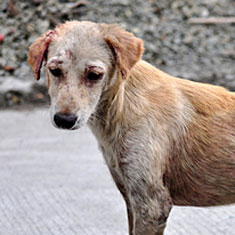
Lobby for stronger animal protection laws in your state or community, and make sure existing laws are enforced. You might want to print out Pet-Abuse.com's guide for prosecutors and take a copy to your local District Attorney's office.
Educate people about taking care of pets. Ask if you can speak at your child's school or at your church or at a civic group meeting. If you're not comfortable speaking in public, ask the organization if you can help them schedule a speaker from your local humane agency.
Distribute pamphlets on pet care behavior wherever you can, such as on grocery store bulletin boards or on the counter of local stores. You can get the pamphlets for free from your humane society. Make sure you have permission to leave the pamphlets before you just dump them somewhere.
When you know someone has just gotten a new puppy, consider giving them a book or video on pet care, or buying a gift card that will allow them to get obedience training, identification tags, or veterinary care. If you know someone who is thinking of getting a puppy, make sure they know what to expect. One of the biggest reasons why pets are dropped off at shelters is because the animal didn't meet the family's expectations.
Volunteer, contribute supplies, or donate money to your local animal shelters and rescue organizations. They can only continue to function if they get sufficient support from those who care. If you don't personally have the money to contribute, consider holding a fundraiser. Have a yard sale, sell lemonade, or sell homemade crafts, giving the profits to a shelter. Ask local business owners to set out a can by their cash registers to collect change for a rescue organization.
Be an activist. When you read of an animal cruelty case, write to your local paper as well as to prosecutors, encouraging them to seek the maximum sentence if the person is found guilty.
Find more suggestions from Best Friends Animal Society.
Above all, be a good role model by showing your dog the proper respect and giving him excellent care. Teach your kids how to care for animals properly, and teach the neighbor kids, as well. One of the ways in which seat belt usage was drastically increased in this country was by reaching out to school children, who then went home and told their parents to wear seat belts. You can use the same method to reach people about taking good care of their dogs.
Doggies Den: Latest Articles
 Homemade Thanksgiving Treats for Your Dog
Homemade Thanksgiving Treats for Your Dog
NUTRITION We all want to include our dogs in our holiday celebrations, but hopefully, you're aware that sharing table scraps with your dog isn't always the best idea.
 Keeping Your Dog Safe during the Summer Months
Keeping Your Dog Safe during the Summer Months
HEALTH Summer is coming on fast, so it’s time to plan how you will keep your dog safe and healthy through the lazy, carefree, warm days.
 Vaccination Time Again-Keeping Your Puppy Healthy
Vaccination Time Again-Keeping Your Puppy Healthy
DOG HEALTH So you have your new puppy picked out. There are quite a few shots, treatments and examinations that will keep the newest member of your family healthy.
 Canine Thanksgiving Feast
Canine Thanksgiving Feast
NUTRITION With the wide variety of food at Thanksgiving dinner, chances are you'll want to give your dog something special, too. If you're contemplating what to feed your dog for the holiday, here is a guide to a great Canine Thanksgiving Feast.
 Dog Walking Tips Every Owner Should Know
Dog Walking Tips Every Owner Should Know
DOG FUN Walking your dog is not only crucial to keeping him healthy and happy, it strengthens the bond between your canine friend and his caregiver. There are a lot of obstacles out there. Don’t forget these simple tips to keep your walk fun and safe in the outside world.
 The Benefits of Physiotherapy for your Dog
The Benefits of Physiotherapy for your Dog
HEALTH The same techniques that physiotherapists use to treat a variety of injuries and conditions in humans have been adapted to suit animals with great success. Family pets, show dogs, and working dogs can all benefit greatly from physiotherapy. Dogs whose activities involve a lot of agility are especially susceptible to the types of problems that physiotherapy can address.
 The Decision- Adding a Dog to Your Family
The Decision- Adding a Dog to Your Family
FIRST TIME OWNERSBringing a dog into your family is a decision where many people don’t realize it’s magnitude until after they have the dog. There are a number of things that you need to research before you decide to purchase a dog, and it starts right in your own home.
 Bringing Your Dog Into Your New Baby's Life
Bringing Your Dog Into Your New Baby's Life
HEALTH Many believe that a dog and a new baby cannot happily coexist, so therefore the dog has to go. This is not necessarily the case.  A new baby does not mean you have to abandon your dog.

Doggies Den:
Most Popular Articles

Dog Pregnancy Symptoms
HEALTHIf you suspect your dog might be pregnant, check out part one in this series on pregnant dogs, where we cover pregnant dog symptoms.

Dog Birth
HEALTHIn the third article of our dog pregnancy series, we look at the wonderful, but messy, process of bringing newborn puppies into the world.

Indoor Dog Potties
DOG PRODUCTSIt's been a long day at work. You were so busy, you didn't even take time to eat a sandwich, let alone run home to let your dog out. You're on your way home, knowing the poor dog is crossing his or her legs by now, when your car breaks down, delaying you even further. Can't somebody make this easier?

Your Dog’s Digestive System
PHYSIOLOGYEver wonder why your dog eats so fast? Or why he eats gross things? Or why he gets sick to his stomach? Or why his waste stinks so bad? Some of these things are normal, some are not.

Canine Respiratory System
BREATHINGThe basic function of your dog's respiratory system is to bring oxygen in to and remove carbon dioxide from the body. Knowing the symptoms of respiratory diseases can help you help your stay healthy.
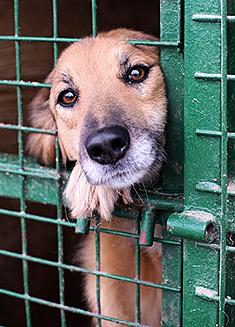
Shelter Dog Adoption Tips for Success
ADOPTION Are you intimidated by the prospect of "rescuing" a dog from a shelter? One reason that you may be wary of adopting a dog from a shelter is not knowing how to choose. Adopting a dog from a shelter can be a rewarding process, if you're prepared to do a reasonable amount of research.
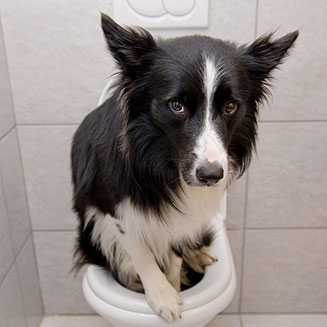
Canine Urinary Tract Infections
SYMPTOMS AND TREATMENTDoes your dog seem to be having trouble relieving his or her bladder? Learn how to recognize the signs of urinary tract infections and how to treat them before they spread.
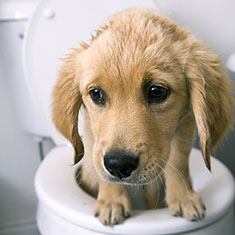
What to do for Dog Diarrhea
SYMPTOMS AND REMEDIESIf you have dogs in your house for any length of time, you have likely experienced at least one bout of dog diarrhea. Beyond the pain in the tuckus involved in cleaning up the mess, you should know what causes diarrhea, and when it's important to see the vet.

What to do for a Dog Bite
DOG BEHAVIOR Getting bitten by a dog can be scary, and you may be tempted to run around in circles for a while, trying to figure out what to do. Here's our guide to help you manage the situation.
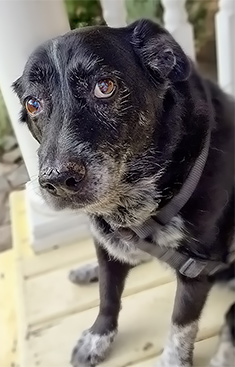
Top Ten Tips for Living with a Senior Dog
DOG HEALTH Bringing home a new puppy is so exciting, but it doesn’t take all that long for your exuberant puppy to grow into a senior dog who may have special needs. Here are the doggies.com top ten tips for taking care of your companion who has been with you through so much.
